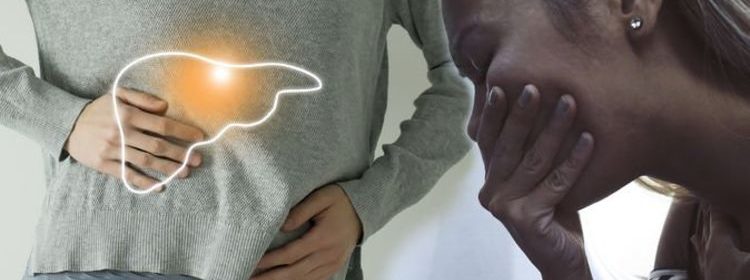Alcoholic fatty liver disease: Fever, nausea or vomiting could be indicators to your risk

Liver disease: NHS Doctor talks about link with alcohol
When you subscribe we will use the information you provide to send you these newsletters.Sometimes they’ll include recommendations for other related newsletters or services we offer.Our Privacy Notice explains more about how we use your data, and your rights.You can unsubscribe at any time.
Fatty liver disease means you have extra fat in your liver. You might hear your doctor call it hepatic steatosis. Heavy drinking makes you more likely to get it. Over time, too much alcohol leads to a build-up of fat inside your liver cells. This makes it harder for your liver to work.
Alcoholic fatty liver disease is preventable, said WebMD.
The health site added: “It usually gets better when you stop drinking alcohol.
“If you keep drinking, alcoholic fatty liver disease can cause serious problems.
These include alcohol hepatitis which is swelling in the liver that can cause fever, nausea or vomiting.
In some cases, depending on the cause of liver disease, these symptoms may come on suddenly.
About 50 percent of people with acute liver disease will have no symptoms.
People living with chronic liver disease may not experience any symptoms until the disease has progressed for many years.
Liver disease can be acute or chronic with acute liver disease occurring when something suddenly damages the liver.
Chronic liver disease occurs when a condition continues to affect the liver for six or more months.
DON’T MISS
Does Pfizer vaccine cause blood clots? [INSIGHT]
Alcohol-related liver disease: Three signs [TIPS]
Bowel cancer: Narrow poo is a visual sign [ADVICE]
Other symptoms to spot of alcoholic fatty liver disease include:
- Tiredness or weakness
- Yellowing of the skin and eyes, known as jaundice
- Dark urine
- Pale stool
- Pain under the ribs on the right side of the body.
Patients with fatty liver disease should be seen routinely in follow-up visits to their doctor in order to monitor their liver function and progression to more serious liver abnormalities.
Since weight loss, diet, and physical activity are the most important tools in minimising the risk of fatty liver disease, and are the most effective treatments, consultations with a dietician and a physical trainer may be appropriate.
The treatment of fatty liver disease is to decrease the potential risk exposures to the liver.
For those with alcoholic liver disease, abstaining from alcohol is a must.
The Substance Abuse and Mental Health Services Administration (SAMHSA) clarified what constitutes as binge drinking.
For females, drinking four or more alcoholic drinks within a couple of hours of each other, on at least one day in the past month, is binge drinking.
For males, this rings true for any man drinking five or more drinks in one day.
Anyone who drinks heavily for months or years puts themselves at risk for alcoholic fatty liver disease.
Source: Read Full Article

